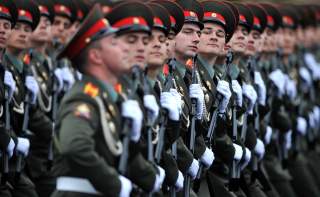11 Suggestions for a New Era of U.S.-Russia Relations
Trump should reassess Russia’s long-term interests, strengths and vulnerabilities, and areas of possible accommodation.
Editor’s Note: The following is part of a multi-part symposium commissioned by the National Interest and Carnegie Corporation of New York. We asked some of the world’s leading experts about the future of U.S.-Russia relations under President-elect Donald Trump. You can find all of their answers here.
You have said you will seek dialogue with Russian president Vladimir Putin. You have rightly shown that (1) you resist rigid thinking and outmoded Cold War attitudes, which are too prevalent in both the United States and Russia; and (2) you will pursue relations with Russia grounded on U.S. interests and the search for areas of potential cooperation. But as of now, we are both moving toward long-term confrontation—or worse.
Some suggestions:
1. Choose advisors able to carry out high-level strategic analysis and planning. They are rare. You will have to insist your team find and include them. Discard Russian experts lacking “open minds” or who try to sell you pet theories: diversity in advice protects you.
2. Demand a thorough and honest assessment of how we and the Russians got into the current mess. Don’t accept at face value that it’s “all the Russians’ fault”—or ours.
3. Demand a fresh assessment of Russia’s long-term interests, strengths and vulnerabilities, and areas of possible accommodation.
4. Publicly recommit the United States as a “European power” and to the NATO Treaty’s Article 5. This is indispensable to earn Europe’s trust and Putin’s respect. Continue implementing decisions of the Wales and Warsaw NATO summits. The U.S. president’s personal commitments and leadership are crucial. They are the linchpins of U.S. global influence with friends and allies, and of deterring enemies.
5. Renew pursuing President George H. W. Bush’s “Europe whole and free and at peace.” It is the best political and security blueprint. It includes a full and respected role for Russia.
6. Tie together all elements of relations with Russia, notably Europe, the Middle East, Central Asia and China.
7. Don’t let Middle East allies and partners make you a prisoner of their own interests, policies and actions; among other dangers, this will weaken your hand with Putin.
8. Consult with former U.S. presidents and senior national security officials.
9. Meet with leaders of Germany, Britain, France and the NATO secretary general before Putin. First develop your own plans and proposals. Never go empty-handed to allies, or just to seek advice. They want and need the U.S. president’s vision and strength.
10. For tactics, focus on arms control, the NATO-Russia Council, Arctic cooperation (already happening), and return to the Helsinki Final Act and OSCE as a de-escalation framework not requiring either side to “lose face.”
11. Keep allies and partners well informed about your strategy and decisions. Also Congress.
Ambassador Robert Hunter is Senior Fellow at the Center for Transatlantic Relations at the Paul H. Nitze School of Advanced International Studies. Follow him on Twitter at @DMHS58.
Image: Military parade on Red Square. Kremlin.ru

